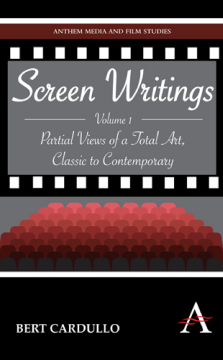
Additional Information
Book Details
Abstract
'Screen Writings: Partial Views of a Total Art, Classic to Contemporary' offers close readings of individual films intended to explain how moviemakers use the resources of the medium to pursue complex and significant humanistic goals. It fills the middle ground between vague, simple plot summaries and theoretical pronouncements. As such, this book can be considered a call for the return of practical criticism as the best way to understand and appreciate the work of cinematic artists.
Bert Cardullo is Professor and Chair of Media and Communication at the Izmir University of Economics in Turkey.
'Bert Cardullo is a fabulous viewer of movies. He practices a kind of film criticism that gives first place to one’s instinct for seeing possibilities in films and for identifying films to see possibilities within. The selection of essays in 'Screen Writings' is remarkable for its range and masterful in its use of language.' —Dudley Andrew, Yale University
'Among my contemporaries, the best film critic writing in English in America is Bert Cardullo, and 'Screen Writings' proves why.' —Dan Harper, American film scholar
'The film writings of Bert Cardullo are fresh and lucid, in addition to being revelatory of his belief that the study of cinema is a sacred calling. I marvel at Cardullo’s profound perceptiveness – particularly on display in 'Screen Writings' – about the exemplary meaning as well as the ultimate magic of the movies.' —Andrew Sarris, Columbia University
The main purpose of 'Screen Writings' is to stake out territory for a certain type of film critic, somewhere between a reviewer-journalist and a scholar-theorist. At a time when the movie review has degenerated into mere publicity for Hollywood pictures, while film scholarship has become entangled in its own pseudo-scientific discourse, the author offers close readings of individual films that go beyond simple plot summaries and vague impressions about acting, yet refrain from hermetic theoretical pronouncements. With elegance, clarity, and rigor, the author explains how moviemakers use the resources of the medium to pursue complex, significant humanistic goals. Thus, in addition to chronicling the vitality and richness of international film art, ‘Screen Writings’ also aims to facilitate its understanding and appreciation.
The reviews and re-viewings contained in ‘Screen Writings’ are acts of analysis and interpretation in the humanistic sense - they are neither theoretical musings nor pedantic tracts. As such, this book can be considered a call for the return of practical criticism as the best way to understand and appreciate the work of cinematic artists, including directors from a countries across the world. Contemporary films like ‘Brokeback Mountain’ and ‘Lost in Translation’ are treated, as well as classics like ‘Tokyo Story’, ‘Forbidden Games’, and ‘Some Like It Hot’. These review-essays are supplemented by a previously unpublished interview with LuchinoVisconti and a investigation of the new screen violence, as well as by a bibliography of related criticism, directors' filmographies, individual film credits, and a thorough index.
'A lot of what Bert Cardullo has to say about contemporary world cinema would be interesting to a very wide audience… He is someone with an impressive and stimulating command of the difficult dance of the film review.' —Jerry White, University of Alberta
'Bert Cardullo's articles and reviews are invariably intelligent, original, and highly informed. I have been a sturdy admirer of his work for years; he’s a solid writer and an equally solid judge.' —Frederick Morgan, American poet
'Bert Cardullo's work is one of the brightest beacon lights in the world of film criticism, and 'Screen Writings' is a wide-ranging new collection makes that light shine even more brightly.' —Stanley Kauffmann, American film critic
Table of Contents
| Section Title | Page | Action | Price |
|---|---|---|---|
| Cover | i | ||
| Front Matter\r | ii | ||
| Half Title\r | ii | ||
| Title\r | iv | ||
| Copyright\r | v | ||
| Table of Contents\r | vi | ||
| List of Illustrations\r | viii | ||
| Main Body\r | x | ||
| Introduction: The Necessary Film\r | x | ||
| Part I. Children and the Cinema\r | 1 | ||
| 1. Children of a Lesser God: The Children's Film from De Sica to Kore-eda\r | 3 | ||
| 2. Death Wish, Child's Whim, 'Auteurist' Will: Boyer and Clement's 'Forbidden Games' Replayed\r | 19 | ||
| 3. War Games: On Bahman Ghobadi's 'Turtles Can Fly'\r | 31 | ||
| Part II. Literature and Adaptation\r | 37 | ||
| 4. \"Outing\" Edward, Outfitting Marlowe: Derek Jarman's Film of 'Edward II'\r | 39 | ||
| 5. Theater and Fiction into Film: Notes on Paradigmatic Scenes and Emblematic Adaptations \r | 51 | ||
| Ilustrations | |||
| Part III. Views and Interviews\r | 87 | ||
| 6. Married to the Job: Ermanno Olmi's 'Il posto' and 'I fidanzati' Reconsidered\r | 89 | ||
| 7. Reflecting Reality - and Mystery: An Interview with Ermanno Olmi\r | 99 | ||
| 8. Lower Depths, Higher Planes: On the Dardennes' 'La Promesse', ' Rosetta', 'The Son' and 'L'Enfant'\r | 113 | ||
| 9. The Cinema of Resistance: An Interview with Jean-Pierre and Luc Dardenne\r | 139 | ||
| Part IV. World Enough and Time\r | 155 | ||
| 10. The World Is Too Much with Us: Violence on Screen, or Realism, Reality, and the An-esthetic of the Unreal\r | 157 | ||
| 11. Characterizing Space, Configuring Time: Notes, Mostly on Antonioni's 'L'avventura' and 'La notte'\r | 169 | ||
| 12. As Time Goes By: Memory and the Movies\r | 189 | ||
| End Matter\r | 211 | ||
| Bibliography of Related Criticism\r | 211 | ||
| Index\r | 215 |
